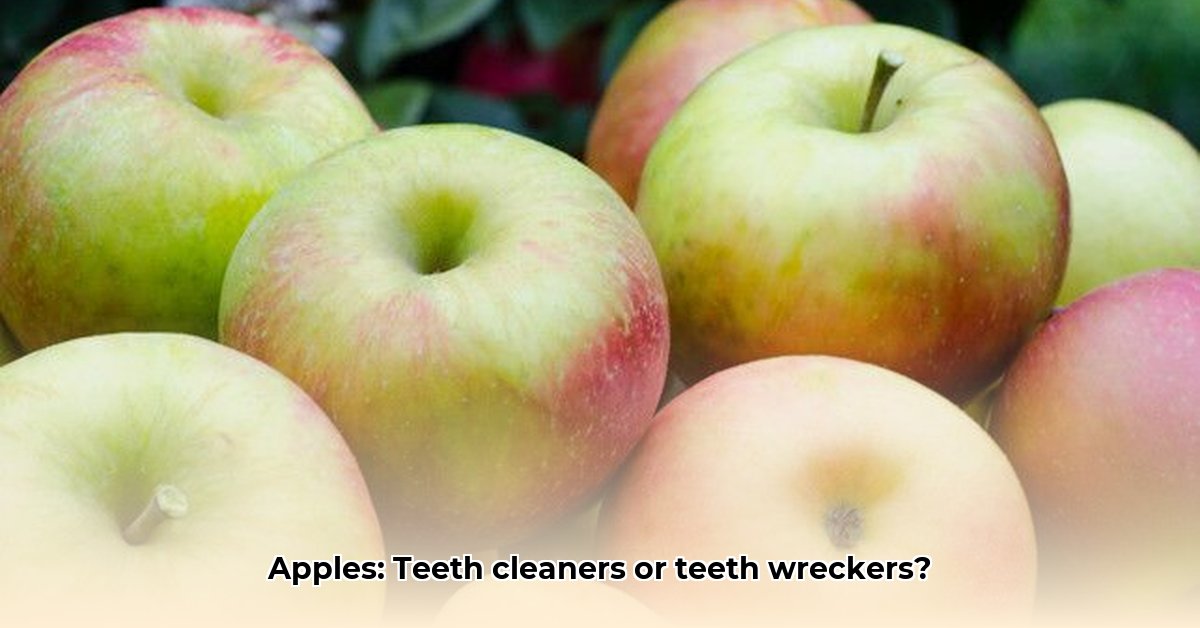“`markdown
Do Apples Clean Your Teeth? The Truth About Oral Health Benefits
Ever wondered if that crunchy apple could replace your toothbrush? It’s a common question, and the answer isn’t a simple yes or no. This article takes a closer look at whether apples can actually help clean your teeth, separating fact from fiction. We’ll explore what the research says, explain how apples *might* offer some benefit, and most importantly, remind you about the importance of good old-fashioned brushing and flossing. We’ll keep it straightforward and easy to understand, so you can get the information you need without any confusing dental jargon.
For a deeper dive into apple’s effect on teeth, check out this helpful article: Apple and teeth.
Do Apples Clean Your Teeth? Unveiling Oral Health and Hygiene
We’ve all heard the saying, “An apple a day keeps the doctor away.” But does it also keep the dentist away? Many people believe that chomping on a crisp apple acts like a natural toothbrush, scrubbing away food particles and leaving teeth sparkling clean. But is this really true? Let’s dive into the juicy details and find out if apples truly deserve a spot in your oral hygiene routine, and if they contribute to dental health.
The Apple’s Natural “Scrubbing” Action and Saliva Boost
Apples, with their firm texture and fibrous flesh, certainly provide a bit of a mechanical cleaning action. As you bite and chew, the apple’s fibers work to dislodge bits of food stuck between your teeth. This physical scrubbing is similar to the action of a toothbrush, though much less thorough. Think of it as a quick, preliminary clean—helpful, but definitely not a replacement for a proper brushing. It’s like giving your teeth a quick wipe down before a real cleaning.
This chewing action also has another benefit: it stimulates saliva production. Saliva is nature’s own mouthwash! It helps to neutralize acids, wash away food debris, and generally keep your mouth feeling fresh and clean. So, while crunching on an apple isn’t a full dental cleaning, it does contribute to a healthier mouth environment and helps with natural teeth cleaning.
The Double-Edged Sword of Saliva and Acidity: Finding Balance in Oral Care
Increased saliva flow is fantastic for oral health, but the story doesn’t end there. Apples, while nutritious, contain malic acid, which gives them that satisfying tartness. This same acid, though, is a bit of a double-edged sword. While saliva helps neutralize some of this acidity, prolonged exposure to malic acid can gradually wear down your tooth enamel, the protective outer layer of your teeth. Think of it like constantly rubbing a slightly abrasive material on a fine surface – eventually, it will wear it down. This weakening of enamel makes your teeth more susceptible to cavities.
So, while the increased saliva production is beneficial, it’s not enough to entirely counteract the potential enamel-eroding effects of the apple’s natural acids. It’s a balancing act, and the benefit isn’t always guaranteed, so moderation is important when considering apple’s impact on enamel.
The Sneaky Sugar Factor in Apple Consumption
Another thing to consider is the sugar content in apples. Although it’s natural sugar, it still fuels the bacteria that thrive in your mouth and contribute to plaque buildup. Plaque is a sticky film that accumulates on your teeth, leading to cavities and gum disease. Essentially, the sugar in your apple helps feed the very bacteria you’re trying to discourage. It’s a bit ironic, isn’t it? A seemingly healthy snack can still contribute to dental problems if left unchecked, highlighting the importance of managing sugar intake.
Weighing the Pros and Cons: Apples and Your Smile Health
To get a clearer picture, let’s lay out the benefits and drawbacks of apples in relation to oral health:
| Aspect | Pros | Cons |
|---|---|---|
| Mechanical Cleaning | Helps dislodge some food particles | Doesn’t reach all areas; limited effectiveness |
| Saliva Stimulation | Increases saliva flow, neutralizing acids | May not fully neutralize the malic acid’s effects |
| Acid Content (Malic Acid) | Contributes to the apple’s flavor | Can soften tooth enamel, increasing cavity risk |
| Sugar Content | Natural sweetness | Feeds bacteria, promoting plaque buildup |
The Verdict: Apples and Oral Hygiene – A Balanced Approach to Dental Care
So, do apples clean your teeth effectively enough entirely replace brushing and flossing? The answer is a resounding no. While apples offer some minor cleaning benefits through mechanical action and increased saliva, they aren’t a substitute for good oral hygiene practices. The acid and natural sugars in apples pose real risks to your teeth.
Enjoy your apples, definitely! They’re a part of a healthy diet. But don’t rely on them to do the work of your toothbrush and floss. The best approach is to treat apples as a tasty addition to a complete oral hygiene routine that includes regular brushing, flossing, and checkups with your dentist. This approach ensures a healthy, happy smile for years to come. After all, a vibrant smile is far more valuable than trying to cut corners on oral care, emphasizing the need for comprehensive dental care.
How Apples Affect Teeth Enamel and Gum Health: A Balanced Perspective
Key Takeaways:
- Apples stimulate saliva production, which helps neutralize acids and cleanse your mouth.
- The fiber in apples acts like a natural toothbrush, scrubbing away plaque.
- Their vitamin C content supports healthy gums.
- However, apples’ natural sugars and acids can erode enamel and contribute to cavities with excessive consumption.
- Proper oral hygiene is crucial regardless of apple consumption. Brushing and flossing are essential for optimal gum health.
- Whole apples are generally preferred over apple juice due to the fiber content.
The Apple Paradox: Benefits and Drawbacks on Oral Health and Enamel Strength
So, you love a crisp, juicy apple. But does this healthy snack help or hurt your teeth? The answer, like so many things in life, is nuanced. How apples affect teeth enamel and gum health depends on several factors.
Apples boost saliva production. This natural mouthwash helps neutralize acids and wash away food particles. It’s like nature’s built-in mouth rinse! The fibrous texture offers a gentle abrasive action, helping to clean teeth. Think of it as a natural, albeit slightly less effective, toothbrush, showcasing the natural cleansing properties of apples.
But there’s a catch. Apples contain natural sugars and acids. These can contribute to enamel erosion and cavities, particularly when consumed frequently without proper oral hygiene. It’s a balancing act.
The Role of Acidity and Sugar in Dental Health
The acidity of apples varies. Tart varieties like Granny Smith might be more acidic than sweeter apples. Excessive consumption of any acidic food can wear down enamel over time. The sugar content fuels bacteria that produce acids, leading to decay. It’s not just the quantity but also the frequency of consumption that matters. How can we balance acidity and sugar in apples to manage dental health?
How to Enjoy Apples Responsibly: Tips for Dental Care
Here’s the good news: you don’t have to banish apples from your diet! Here’s how to enjoy them mindfully:
- Moderation is key: Aim for one to two apples a day.
- Rinse and brush: Rinse your mouth thoroughly with water after eating an apple. Wait about 30 minutes before brushing to avoid scrubbing away weakened enamel.
- Choose wisely: Opt for whole apples, avoiding pre-sweetened apple juice to minimize sugar exposure.
- Maintain excellent oral hygiene: This is the most crucial factor. Brush and floss twice daily and visit your dentist regularly.
Beyond the Fruit: The Big Picture on Enamel Protection and Dental Regimen
The impact of apples on your teeth isn’t isolated. It’s part of your overall diet and oral care routine. A balanced diet, limiting sugary drinks and processed foods, and consistent brushing and flossing are essential regardless of your apple consumption habits. Think of it as a team effort: your diet and your oral hygiene work together, showing the importance of a holistic dental regimen.
Considering the Whole Picture: A Balanced Approach to Oral Health
Remember, how apples affect teeth enamel and gum health is a nuanced topic. While apples offer some benefits, responsible consumption and diligent oral hygiene remain critical for maintaining a healthy smile. Consider apples as part of a balanced lifestyle, not a standalone solution for oral health.
Apple Fiber and Gum Health: A Comprehensive Analysis of Dietary Fiber Benefits for Dental Wellness
Key Takeaways:
- Apples stimulate saliva production, aiding in natural plaque removal.
- The fibrous texture provides a mild abrasive cleaning action.
- Apples offer Vitamin C, beneficial for gum health.
- Apple’s acidity and sugar content can erode enamel if consumed excessively.
- Apples are not a replacement for thorough brushing and flossing.
- Consistent oral hygiene remains crucial for optimal dental health.
The Apple and Your Teeth: Unveiling the Nutritional and Cleansing Factors
So, do apples clean your teeth? It’s not quite that simple. While the crunchy texture and natural components offer some oral health advantages, they’re not a magic bullet. Think of it like this: apples are a helpful teammate, but not the whole team. What are the nutritional factors in apples that play a role in teeth health?
- Stainless Steel Food Storage for Healthier, Eco-Friendly Meal Prep - February 27, 2026
- Stainless Food Containers Offer Durable Storage for Everyday Meals - February 26, 2026
- Stainless Steel Containers Offer Superior Food Preservation and Durability - February 25, 2026










